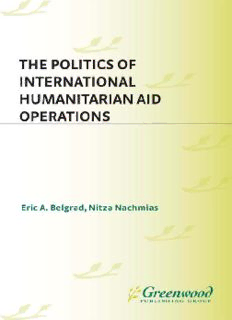
The Politics of International Humanitarian Aid Operations PDF
Preview The Politics of International Humanitarian Aid Operations
The Politics of International Humanitarian Aid Operations This page intentionally left blank THE POLITICS OF INTERNATIONAL HUMANITARIAN AID OPERATIONS Edited by ERIC A. BELGRAD and NlTZA NACHMIAS Foreword b) GENERAL SIR MICHAEL ROSE QN Westport, Connecticut PRAEGER London Library of Congress Cataloging-uvPublication Data The politics of international humanitarian aid operations / edited by Eric A. Belgrad and Nitza Nachmias ; foreword by Sir Michael Rose, p. cm. Includes bibliographical references and index. ISBN 0-275-95273-8 (alk. paper) 1. Humanitarian assistance. 2. Humanitarian assistance—Case studies. I. Belgrad, Eric A., 1935- . II. Nachmias, Nitza. HV553.P64 1997 361.2'6—dc20 96-44677 British Library Cataloguing in Publication Data is available. Copyright © 1997 by Eric A. Belgrad and Nitza Nachmias All rights reserved. No portion of this book may be reproduced, by any process or technique, without the express written consent of the publisher. Library of Congress Catalog Card Number: 96-44677 ISBN: 0-275-95273-8 First published in 1997 Praeger Publishers, 88 Post Road West, Westport, CT 06881 An imprint of Greenwood Publishing Group, Inc. Printed in the United States of America The paper used in this book complies with the Permanent Paper Standard issued by the National Information Standards Organization (Z39.48-1984). P Copyright Acknowledgments The editors and publisher are grateful to the following for granting permission to reprint from their material: Portions of Chapter 7 appeared in Janet E. Heininger, Peacekeeping in Transition: The United Nations in Cambodia (New York: Twentieth Century Fund Press, 1994). In order to keep this title in print and available to the academic community, this edition was produced using digital reprint technology in a relatively short print run. This would not have been attainable using traditional methods. Although the cover has been changed from its original appearance, the text remains the same and all materials and methods used still conform to the highest book-making standards. This book is dedicated to the Nachmias granchild, Nir Tomer, and to the Belgrad grandchildren, Alex, Benjamin, Gideon, Max, and Asher. May they grow up and flourish in a world free of war and filled with humanitarian concern. This page intentionally left blank Contents Foreword ix General Sir Michael Rose Introduction xiii Eric A. Belgrad Acronyms xv Part I Issues and Concepts in International Humanitarian Aid Operations 1. The Politics of Humanitarian Aid 3 Eric A. Belgrad 2. Military Risk and Political Commitment in UN Humanitarian Peace Support Operations 19 Jim Whitman 3. Human Rights and Humanitarian Operations: Theoretical Observations 3 7 David P. Forsythe 4. Humanitarian Aid Operations and Peacekeeping 53 Alan fames Vlll Contents Part II Humanitarian Aid Operations: Case Studies 5. The Case of UNRWA: Five Decades of Humanitarian Aid 69 Nitza Nachmias 6. The Case of Rwanda and Burundi: Two Perspectives 89 RWANDA AND BURUNDI: A FUTURE PATH FOR RECONCILIATION IN CENTRAL AFRICA 89 Kenneth F. Hackett To SAVE ONE LIFE IS TO SAVE THE WORLD: THE ISRAELI OPERATION IN RWANDA 96 Michael Wiener with Nitza Nachmias 7. Cambodia: Relief, Repatriation, and Rehabilitation 111 Janet E. Heininger 8. Humanitarian Aid in the Former Yugoslavia: The Limits of Militarized Humanitarian Assistance 137 Joseph R. Rudolph, Jr. Part III Prospects for Future Humanitarian Interventions 9. The United Nations High Commissioner for Refugees in the Post-Cold War Era 157 Gil Loescher 10. Conflict and Cooperation: Humanitarian Action in a Changing World 171 Thomas G. Weiss 11. By Way of Conclusion 189 Leon Gordenker Selected Bibliography 199 Index 209 About the Editors and Contributors 219 Foreword GENERAL SIR MICHAEL ROSE Any work which contributes to an understanding of how the international com- munity can better confront the challenge of creating stability in the face of problems spawned by the fast-expanding economically and politically insecure populations of the world is to be warmly welcomed. The Politics of International Humanitarian Aid Operations, focusing on this vitally important area, seeks to draw lessons from the past which will not only be helpful to academic thinking but also highly useful to practitioners in the field. Neither political consideration nor emotional response caused by vivid media coverage is likely ever to replace the moral imperative as a sufficient basis for developing an adequate international response to the sort of disorder and con sequent human suffering which occurred in Somalia and Yugoslavia, and which continue to occur in many other areas of the world. Political motives for inter vention will always be tempered by regard to self-interest and perceived cost in human and financial terms, whilst media coverage will always tend to be hap hazard and inconsistent in quality. Neither, therefore, should become the sole factor in determining international policy. The response to the moral imperative must lie in promoting a greater world understanding of both the limitations and the aspirations of the international community. Clearly, there must also be pro vision of an intergovernmental planning and policy-making structure at the United Nations (UN) and regional levels, as well as a specifically agreed-on international doctrine for humanitarian aid operations—what defines their lim itations, and how the competing political, security, and aid components of such
Description: